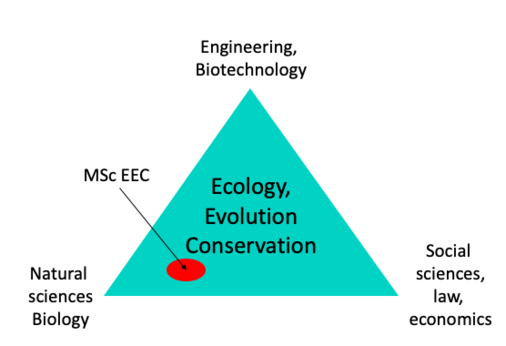
Target audience
Overview
Ecology, Evolution and Conservation is a broad field and can be studied from different angles, including 1) natural sciences and biology, 2) social sciences, law and economics, and 3) engineering and biotechnology (see figure below).
Each of these angles is valid and useful, but you should note that this MSC EEC program in Regensburg focuses on the scientific angle, with a small social science and law component.
Thus, this program is designed for students who have previous experience and who want to focus on science-oriented work on the evolution, ecology, and conservation of plants and animals.

Expected background from students applying for the MSc EEC
In line with the ideas above, we expect that students have relevant experience and a BSc in the areas of Ecology, Evolution and Conservation. Typical study programs would be:
- Biology
- Evolution
- Geobotany, biogeography or similar
- Conservation ecology / biology programs
- Environmental science programs with a focus on natural sciences / ecology
Study programs that likely not a good preparation for this MSc are:
- Enviromental law and enviromental economics
- Environmental science programs with a focus on social sciences
- Environmental / forest engineering
- Physical geography, geology or similar
As a quick check, you can ask yourself if your study program covered:
- Basics of botany and zoology including both theoretical and practical species knowledge (i.e. species identification)
- Ecology, evolution, biodiversity and systematics of plants and animals
- Molecular and chemical ecology
- Conservation biology, biodiversity and global change
- Mathematics, chemistry, statistics and bioinformatics for biologists
- A BSc thesis on a topic related to the study of ecology, evolution, behavior or conservation of plants or animals
What can you learn during in the MSc EEC in Regensburg?
As you can see from our website with details about the EEC program, the structure of the MSc EEC is relatively straightforward and, in addition to general soft skills modules and the MSc thesis, allows you to focus on 3 core subjects which are then filled with lectures and lab practicals.
The choice of these core subjects depends on your interests. You can either choose modules that are particularly relevant to a future career in practical conservation, or you can concentrate on either the ecology or evolution of plants and animals.
What are the typical jobs / occupations that you could pursue after this MSc program?
There are many careers in the EEC field, and the following are just a few:
- Research as a biologist in academia (PhD) or in industry (e.g. ecotoxicology, insurance, ...)
- Work as a biologist in governmental organizations, e.g. a nature conservation agency, ministries or the EU
- Work in non-governmental organizations (NGOs)


